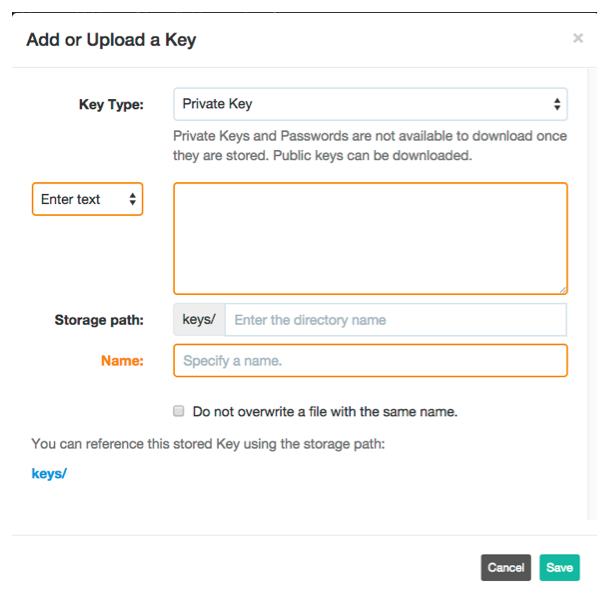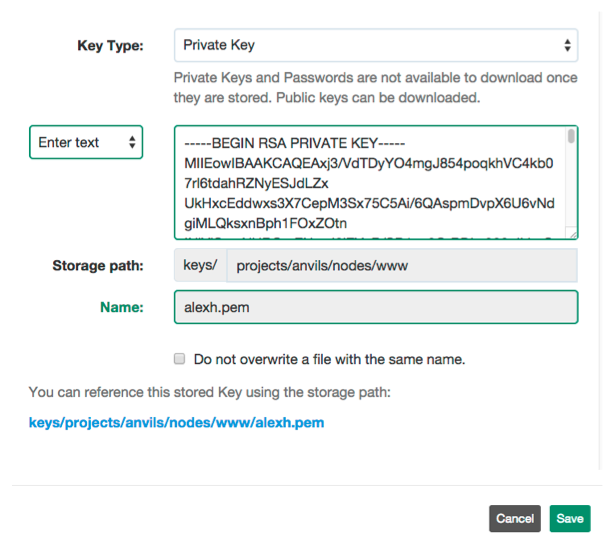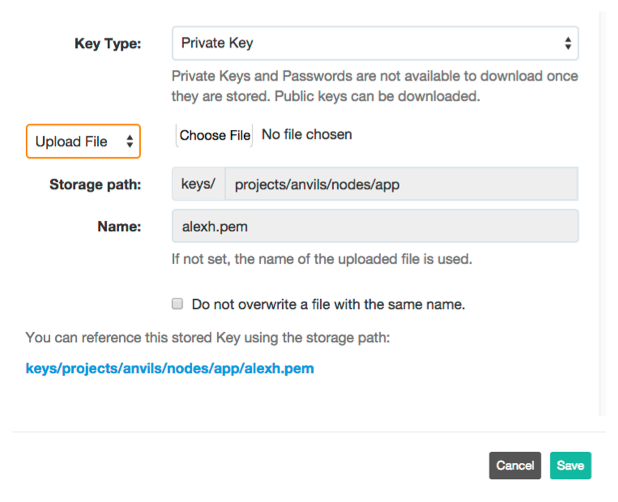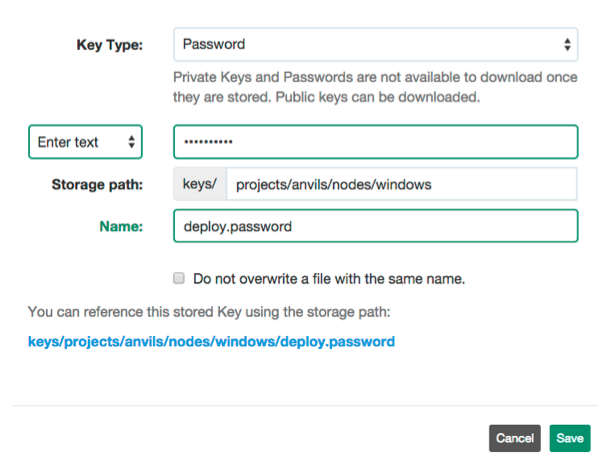Rundeck Key Storage
Rundeck Key Storage
Rundeck Key Storage is a mechanism for Rundeck Admins to implement or utilize existing storage of sensitive private key/password data ("keys") that can be used throughout Rundeck. These keys can be used to configure plugins, node executors, and other aspects of the automation environment.
The Key Storage UI is accessible from either the System Menu (gear icon in upper right), or through the Project Settings menu.
The recommended structure/hierarchy used for organizing Keys is by project. Keys organized by project allow access to be isolated from other contexts at the System level and streamlines providing access to the proper resources by project.
Project scope defined keys should be stored using this formula keys/project/[project-name]/[key-name]. Additional subfolders under the [project-folders] are allowed and can help organize larger sets of keys. (example: keys/project/project1/default.pem)
Using the Key Storage UI
The Key Store page provides a simple browser to navigate folders and perform actions on keys. Keys can be stored either using an uploaded file or as text input.
Key Store Organization
Key Storage organizes keys similar to how files are organized in a file system. Keys can be organized into a folder structure. Here's an example convention that uses three fields to manage keys:
keys/projects/{project}/nodes/{node}/{identity}.pem
The fields in the pattern provide slots to allow multiple projects and users:
- project: project name
- node: might be a specific node or could be a class name like 'www'
- identity: the name of the user
Add Private Key with Text
Press the "Add or Upload a Key" button.

Next, choose "Private Key" for the Key type.

Key data can be added using the content of an uploaded file or as text input.
Choose the "Enter text" option. Paste the key content here.
Enter the storage path and give the key a name.

Here's the form with all the input.
Press the "Save" button.

After the key has been saved, the browser will be updated.

Add Private Key with File

Add a Password

Delete a Key

Storage Plugins
Rundeck offers users the option to use a storage plugin to store key store data in a third party password manager such as HashiCorp Vault, Thycotic Secret Server and Cyberark.
Rundeck currently supports storage plugins for the following providers:
Configuring Storage Plugins
Enterprise versions can use the Key Storage Configuration panel to add new Key Storage plugins. Navigate to the System Menu (gear icon) and select Key Storage. On the Configure Tab choose Add Storage Plugin+ and select the plugin you'd like to configure. Open Source versions will be configured in the rundeck-config.properties file.
Instructions for each specific Key Storage plugin is covered in their respective sections.
Tips
Enterprise versions 4.15.0+ the Storage Plugins have a new configuration process. If you are configuring on a version older than 4.15 you can access previous doc versions at the Old Docs page.
Key Storage on Enterprise Runner
The Enterprise Runner can integrate with secrets management providers to retrieve keys that are then used by operations on the Runner. Further details and configuration steps are outlined in Key Storage through Enterprise Runner.
Key Data Storage Converter
Tips
When you have external key storage configured for rundeck, you may not need the storage converter (encryption) for that particular provider. Since it is an external provider of secrets and already have a security layer from provider-side, you don't need an additional layer of encryption.
Keys can be encrypted in the storage backend by use of a Storage Converter plugin. A typical plugin would encrypt any private-key data at write time, and decrypt it at read time.
The Storage Converter Plugin handles reading and writing the content for any matching resources. The subsequent data is stored in the storage backend (on-disk or in a database) alongside the metadata for the file. If necessary, the metadata content can also be encrypted by modifying the data map that is provided.
Converter plugins do not have to manage storing the data, that will be handled by the Storage backend.
Configuring Storage Converter Plugins
See Plugins User Guide - Configuring Storage Converter Plugins.
Using Keys via Rundeck Node Executors
Built-in JschNodeExecutor
The provided java-based JschNodeExecutor, which is the default used for Node execution, uses Node attributes to determine the type of authentication used when connecting to the Node via SSH. To select private-key based authentication the Node attribute ssh-authentication is used:
ssh-authentication="privateKey"(default value)
The default and typical usage is to use a private key stored on the local file system specified via the ssh-keypath attribute.
Use the following attribute to select one of the stored Keys for authentication.
- Attribute
ssh-key-storage-path- Value
/keys/{path}/{name}- the storage path to the key. Currently all keys are stored under the/keystop-level path.
The value of the ssh-key-storage-path attribute can embed values taken from the execution context of the Rundeck job or execution, for example the username of the user running the job. This would be embedded as ${job.username}, so to specify use of a key named "default.pem" stored in a path with the username of the executing user, the attribute might be set as:
ssh-key-storage-path="/keys/users/${job.username}/default.pem"
When resolved, this will evaluate to /keys/users/bob/default.pem (for example).
Additional Information
ACL Policies
Access to the Keys in the Storage facility are restricted by use of ACL policies.
Access to the keys path requires an Project scope authorization.
The access to the keys can be changed to the Application scope by setting the feature flag:
rundeck.feature.projectKeyStorage.enabled=false
Define access with a for entry of storage.
Authorization can be granted for these actions:
create- create keysupdate- modify keysread- list directories and view and read keysdelete- delete keys
Examples
description: authorize keys/ storage files
by:
group: admin
for:
storage:
- match:
path: 'keys/project/${name}.*'
allow: [read]
- equals:
path: 'keys/project/${name}/test1.pub'
allow: [read,create,update,delete]
- match:
path: 'keys/project/scratch/.*'
allow: [read,create,update,delete]
context:
application: rundeck
Storage backends
The location of stored Key data can be either on the filesystem, the database, or some external system via usage of a Storage Plugin.
Rundeck provides these built-in implementations:
db- stores file data as BLOBs in the database (default)file- stores files locally on the filesystem
API Details
The Key Storage API is provided through the standard Rundeck HTTP API. Rundeck should be configured to use HTTPS, and all API access requires either an authentication token, or username and password authentication.
For users who want overwrite the project defined key storage structure and allow key access at the system level would have to set the configuration property:
rundeck.feature.projectKeyStorage.enabled=false
Enable/Disable public key download
By default, the key storage doesn't allow users to download the content of public keys from API or GUI. This option can be enabled using the following flag:
rundeck.feature.publicKeysDownload.enabled=true
Set the value to true to enable the download public key content. By default, the attribute is set false. This attribute can be set using the System Configuration (Enterprise) or adding the configuration in rundeck-config.properties
Enable/Disable public key GUI download option
Once enabled the download of public key content flag, the key storage doesn't allow users to view and download public keys from the GUI by default. This option can be enabled using the following flag:
rundeck.gui.keystorage.downloadenabled=true
Set the value to true to enable the download/view option. By default, the attribute is set false. This attribute can be set using the System Configuration (Commercial) or adding the configuration in rundeck-config.properties
